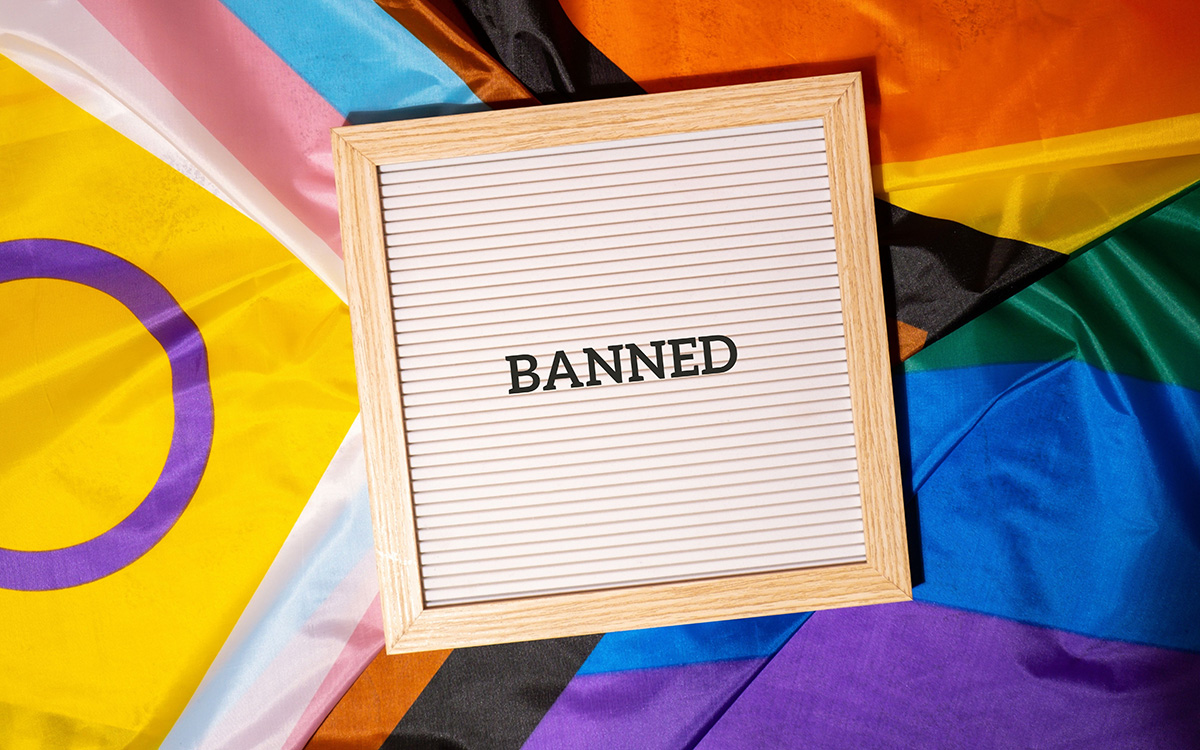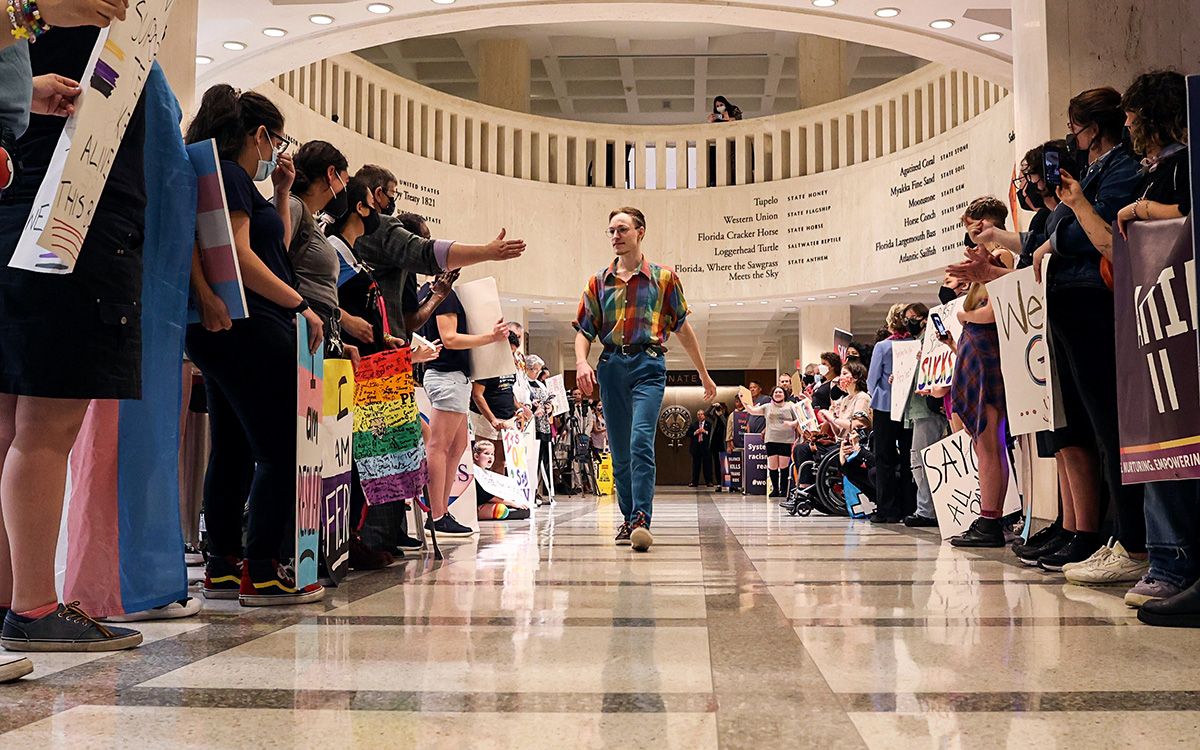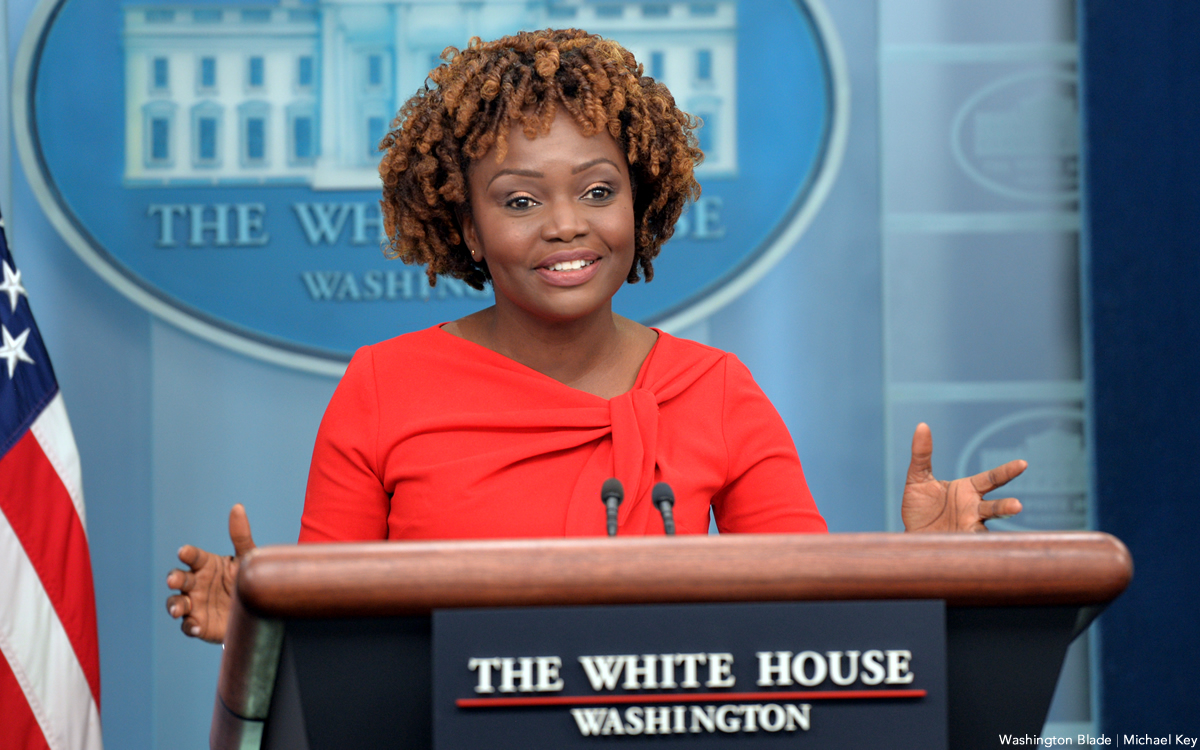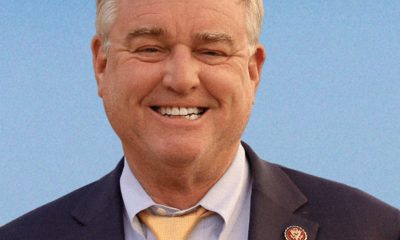National
Bi congressional candidate accuses opponent of homophobic tactics
Critics dismiss Sinema’s charges as ‘preposterous’

A former Arizona state lawmaker who could become the first openly bisexual person elected to Congress is accusing a Democratic primary opponent of telling potential supporters that she can’t win because of her sexual orientation. Meanwhile, LGBT supporters of her opponent have rushed to his defense.
Kyrsten Sinema, who was a state lawmaker for seven years, is competing in a three-way primary set for Tuesday with Andrei Cherny, a former chair of the Arizona Democratic Party, and State Senate Minority Leader David Schapira. The winner gets the Democratic nod to represent the state’s 9th congressional district in the U.S. House.
In a Washington Blade interview on Friday, Sinema had particularly harsh words for Cherny, whom she said has engaged in “very, very, very dirty” campaign tactics by telling potential supporters she wouldn’t be a good choice for the Democratic nomination because she’s bisexual and single.
“Unfortunately, his strategy every time he runs for office has been to really seek to tear down his opponent instead of putting forth his own positive ideas for the future,” Sinema said. “We’re seeing that same strategy again in this election.”
In one instance, Sinema said she was told by a union — which ultimately chose to endorse her — that Cherny said during an earlier endorsement interview that she couldn’t win because of her sexual orientation.
“I got a call from some union folks who support my campaign because of my long history of standing with working families,” Sinema said. “Apparently, he had told some of them in interviews that I couldn’t win the election and that I shouldn’t get the endorsement because I’m openly bisexual and can’t win a general election.”
Sinema said the union asked her later about her sexual orientation and she replied, “It’s true that I’m openly bisexual, I have been my entire adult life, and I’ve managed to win four elections, and, meanwhile, he’s lost two, so perhaps it was being straight that was the problem here.”
Before becoming chair of the Arizona Democratic Party, Cherny lost an election for California State Assembly in 2002 and lost an election to become Arizona state treasurer.
Additionally, Sinema accused Cherny and his wife of telling potential donors she wouldn’t be the right choice because she’s “not a family person.” While Sinema is single and has no children, Cherny is married and has two children.
“I spent nearly two decades as a social worker and an educator with kids,” Sinema said. “So, my whole life has been about helping middle-class families. So it’s just kind of a hollow argument to say I’m not a family person.”
However, Sinema said the strategy “backfired” and as a result of him allegedly making these comments to potential donors, she’s received phone calls from individuals offering help because they considered it “a distasteful strategy.”
Sinema declined to identify the union or the potential donors to whom Cherny allegedly made the accusations.
Seth Scott, Cherny’s campaign manager, responded to Sinema’s accusations by denying the charges and calling her a liar.
“Kyrsten Sinema’s false accusation is a dirty, desperate and slanderous lie,” Scott said. “Sinema’s willingness to make up such egregious lies tells us all we need to know about her own personal character, her standing in the polls and her fitness for office.”
It’s not the first time Sinema has accused Cherny of underhanded campaign tactics. In May, The Hill newspaper reported that Sinema and Schapira issued a joint statement criticizing Cherny for what they called “Karl Rove-styled attacks” from an earlier campaign as well as in the current primary.
According to The Hill, Sinema and Schapira criticized Cherny for his 2002 campaign for a seat in the California State Assembly. The mailer featured a photograph of a tattooed black male with a gun, suggesting voters would be unsafe under Cherny’s opponent. Further, Sinema and Schapira reportedly accused Cherny of circulating false information to right-wing publications, misrepresenting news articles and employing guilt by association to attack other Democrats. Cherny’s supporters reportedly said the other candidates were smearing him and Cherny was quoted as saying the 10-year-old flier doesn’t reflect the work he’s done over the past 15 years.
Sinema, who is known as an LGBT rights advocate in Arizona and led campaigns against state ballot initiatives prohibiting same-sex marriage, has been endorsed by major LGBT organizations, including the Human Rights Campaign and the Gay & Lesbian Victory Fund.
Denis Dison, a Victory Fund spokesperson, said the campaign tactics that Sinema says Cherny is employing against her aren’t unusual in tight races involving LGBT candidates.
“It’s something we’ve seen before in races as they’ve come down to the wire and our candidates are in a good position,” Dison said. “Unfortunately, even in Democratic primaries, you see people start to play this ‘sexual orientation’ card. It’s particularly unfortunate that this is happening in a primary in a party that is supposed to beyond this type of politicking. But you see it from time to time, and it’s unfortunate that it is apparently happening now in Kyrsten’s race.”
Some prominent LGBT individuals in Arizona rallied behind Cherny in the face of the accusations, saying that they couldn’t believe he would make homophobic remarks and that Sinema was making accusations without offering proof.
Jim Kolbe, a gay Republican who formerly represented Arizona in the U.S. House, called the allegations against Cherny “preposterous” and said there’s no way the candidate would employ such campaign tactics.
“I’ve known Andrei for a number of years and there has never been anybody that is more open, more gay friendly,” Kolbe said. “It’s just inconceivable that he would try and make that charge. It’s ironic, I guess, a sign of times, that gay politics has come to this, where instead of accusing somebody of being gay, you accuse of maybe not being gay enough. But, obviously, that’s not true. I feel absolutely certain that’s not accurate.”
Neil Giuliano, a gay former mayor of Tempe, Ariz., and former head of the Gay & Lesbian Alliance Against Defamation, said he knows Cherny and there’s “nothing homophobic or anti-gay” about the candidate.
“I understand it’s been a really rough race between the three of them,” Giuliano said. “They’re all good people, but I’m compelled to weigh in on Andrei’s behalf because I just can’t, for the life of me, believe that kind of an accusation against Andrei Cherny. I just don’t believe it.”
According to Federal Election Commission reports, Giuliano has contributed a total of $1,500 to Cherny, but Giuliano said he otherwise has stayed out of the race.
Rebecca Wininger, a lesbian Phoenix, Ariz., activist, said she backed Cherny early in his campaign and doesn’t believe he would make homophobic comments because people within his family are members of the LGBT community.
“I’ve seen him interact with them with love and support, and I can’t believe the Andrei I know would make such statements,” Wininger said.
Wininger is board president of Equality Arizona, but she said she was speaking on her own behalf and not as part of any organization.
The three Democrats have been involved in a fierce fundraising battle with less than one week before the primary. The Washington Blade was unable to find any recent, independent polls reflecting the state of the campaign.
According to the most recent Federal Election Commission reports, Cherny has raised the most money, a total of $861,477 while spending $572,889 and having $289,088 in cash on hand. In comparison, Sinema has raised $747,403, spent $592,909 and has $154,495 in cash on hand. Meanwhile, Schapira has $237,889 in net receipts, spent $223,826 in expenditures, has $14,063 in cash on hand.
Besides making allegations about Cherny, Sinema said during the Blade interview she’s committed to LGBT issues and sees passage of the Employment Non-Discrimination Act and second-parent adoption as priorities along with other initiatives if she’s elected to Congress.
National
From LGBTQ book bans to internet bans: A bipartisan attack on knowledge
Online safe spaces for queer youth increasingly at risk

“They had LGBTQ-inclusive books in every single classroom and school library,” Maxx Fenning says of his high school experience. “They were even working on LGBTQ-specific course codes to get approved by the state,” he said, describing courses on queer studies and LGBTQ Black history.
No, Fenning didn’t grow up in Portland or a Boston suburb. Fenning graduated from a South Florida high school in 2020. Florida’s transformation from mostly affirming to “Don’t Say Gay” has been swift, he says. “It feels like a parallel universe.”
Fenning, who just graduated from the University of Florida, follows the developments closely as the executive director of PRISM FL Inc., a youth-led LGBTQ nonprofit he founded at 17. “I’ve watched so many of the things that I kind of took advantage of be stripped away from all of the students that came after me,” Fenning says. “It’s one thing to be in an environment that’s not supportive of you. It’s another thing to be in an environment that’s supportive of you and then watch it fall apart.”
“It’s just gut-wrenching,” Fenning explained, describing how Florida’s increasingly hostile legislation has transformed the state he has lived in most of his life.
Most recently, Florida passed HB3, “Online Protections for Minors,” which bans youth under 14 from having social media accounts. Youths aged 14 and 15 need parental consent before getting accounts and any minor must be protected from “harmful content” online.
Unlike the previous legislation, which came predominately from the right and directly targeted issues like gender-affirming healthcare or DEI, HB3 is part of a bipartisan push across the country to regulate social media, specifically for youth. HB3 was co-sponsored by Michele K. Rayner, the openly queer Black member of the Florida Legislature, alongside many of her colleagues across the aisle. Similar national legislation, like Kids Online Safety Act, includes 68 Democratic and Republican sponsors.
Shae Gardner, policy director at LGBT Tech, explains that this legislation disproportionately harms LGBTQ youth, regardless of intentions or sponsors.
Gardner says that while all these bills claim they are for the safety of kids, for LGBTQ youth, “you are putting them at risk if you keep them offline.” She explains that “a majority of LGBTQ youth do not have access to affirming spaces in their homes and their communities. They go online to look like that. A majority say online spaces are affirming.”
Research by the Trevor Project, which reports that more than 80% of LGBTQ youth “feel safe and understood in specific online spaces” backs this up. Specific online spaces that are under target from legislation, like TikTok, are disproportionately spaces where LGBTQ youth of color feel safest.
“For LGBTQ people, social media has provided spaces, which are, at once both public and private, that encourage, and enhance … a great deal of self-expression that is so important for these communities,” confirms Dr. Paromita Pain, professor, Global Media Studies & Cybersecurity at University of Nevada, Reno. She is the editor of the books “Global LGBTQ Activism” and “LGBTQ digital cultures.”
Fenning emphasizes that with bills like “Don’t Say Gay,” in Florida — and other states including North Carolina, Arkansas, Iowa, and Indiana — LGBTQ youth have less access to vital information about their health and history. “Social media [are] where young people increasingly turn to get information about their community, their history, their bodies and themselves.”
At PRISM, Fenning works to get accurate, fact-backed information to Florida youth through these pathways, ranging from information on health and wellbeing to LGBTQ history to current events. The feedback has been overwhelmingly positive. Often youth tell him “I wish I learned this in school,” which is a bittersweet feeling for Fenning since it represents how much young LGBTQ youth are missing out on in their education.
Morgan Mayfaire, executive director of TransSOCIAL, a Florida advocacy group, said that these internet bans are an extension of book bans, because when he was a teen, books were his pathway into the LGBTQ community. “For me it was the library and the bookstores that we knew were LGBTQ friendly.” Now 65, Mayfaire understands that “kids today have grown up with the internet. That’s where they get all their information. You start closing this off, and you’re basically boxing them in and closing every single avenue that they have. What do you think is going to happen? Of course, it’s going to have an impact emotionally and mentally.”
Fenning says that social media and the internet were powerful to him as a teen. “I was able to really come into my own and learn about myself also through social media. It was really powerful for me, building a sense of self.” Gardner agrees, sharing that legislation like this, which would have limited “15-year-old me, searching ‘if it was OK to be gay’ online, would have stagnated my journey into finding out who I was.”
Gardner also explains that many of the bills, like HB3, limit content that is “harmful” or “obscene” but do not specifically define what that content is. Those definitions can be used to limit LGBTQ content.
“Existing content moderation tools already over-censor LGBTQ+ content and users,” says Gardner, “they have a hard time distinguishing between sexual content and LGBTQ+ content.” Pain emphasizes that this is no accident, “there are algorithms that have been created to specifically keep these communities out.”
With the threat of fines and litigation from HB3, says Gardner, “moderation tools and the platforms that use them is only going to worsen,” especially since the same legislators may use the same terms to define other queer content like family-friendly drag performances.
In addition to being biased, it has devastating effects on LGBTQ youth understanding of their sense of identity, Fenning explains. “That perception of queer people as being overly sexual or their relationships and love being inherently sexual in a way that other relationships aren’t does harm to our community.”
Gardner acknowledges that online safety has a long way to go — pointing to online harassment, cybercrime, and data privacy—but that these bills are not the correct pathways. She emphasizes “everybody’s data could be better protected, and that should be happening on a federal level. First and foremost, that should be the floor of protection.”
She also emphasizes that content moderation has a long way to go from targeting the LGBTQ community to protecting it. “Trans users are the most harassed of any demographic across the board. That is the conversation I wish we were having, instead of just banning kids from being online in the first place.”
Being queer on the ground in Florida is scary. “The community is very fearful. This [legislation] has a big impact on us,” explains Mayfaire.
“I mean, it sucks. Right?” Fenning chuckles unhappily, “to be a queer person in Florida. In a state that feels like it is just continuously doing everything it can to destroy your life and all facets and then all realms.”
Despite the legislative steamrolling, several court wins and coordinated action by LGBTQ activists help residents see a brighter future. “There’s a weird tinge of hope that that has really been carrying so many queer people and I know myself especially this year as we’re seeing the rescinding of so many of these harmful policies and laws.”

For example, this March, Florida settled a challenge to its “Don’t Say Gay” legislation that significantly lessens its impact. Already, experts warn that HB3 will face legal challenges.
Pain emphasizes that social media is central to LGBTQ activism, especially in Florida. “There have been examples of various movements, where social media has been used extremely effectively, to put across voices to highlight issues that they would not have otherwise had a chance to talk about,” she says, specifically citing counteraction to “Don’t Say Gay.” That is another reason why legislation like this disproportionately harms LGBTQ people and other minority groups, it limits their ability to organize.
Fenning emphasizes that HB3 directly attacks spaces like PRISM, which do not just share information for the LGBTQ community, but provide spaces for them. “Foundationally it provides an opportunity for the community,” he says, but more than anything, it provides a space, where “you can you can learn from your queer ancestors, so to speak, and take charge.” And that is invaluable.
(This story is part of the Digital Equity Local Voices Fellowship lab through News is Out. The lab initiative is made possible with support from Comcast NBCUniversal.)
The White House
EXCLUSIVE: White House Press Secretary Karine Jean-Pierre on speaking out and showing up
On the two-year anniversary of her appointment, she says, ‘representation matters’

Karine Jean-Pierre sat down with the Washington Blade for an exclusive interview in her office on Tuesday, a week before the two-year anniversary of her appointment as America’s first Black and first openly queer White House press secretary.
Her history-making tenure has come at an especially fraught time for LGBTQ people.
The Biden-Harris administration has been widely celebrated as the most pro-equality in history. Over the past four years, rights and freedoms were expanded through the passage of landmark legislation and the enactment of bold new policies by federal agencies like the FDA and U.S. Department of Education, while the president elevated record-breaking numbers of LGBTQ appointees to serve in the highest levels of government.
At the same time, conservative Republicans have led an unprecedented legislative assault on queer people, especially transgender and gender-expansive youth, which has been accompanied by an escalation of dangerous fear and hate-mongering rhetoric against the community and spikes in bias-motivated acts of violence as well as depression, anxiety, self-harm behaviors, and deaths by suicide.
On these matters Jean-Pierre has often spoken out, addressing reporters from the lectern in the West Wing’s James S. Brady Press Briefing Room in remarks that have often gone viral and driven news coverage.
Reflecting on her tenure, the 49-year-old press secretary explained why she is uniquely positioned to leverage her influence as the most visible spokesperson for President Joe Biden, Vice President Kamala Harris, and the administration — at this pivotal moment for LGBTQ people both at home and abroad.
Leadership comes from the top
“Representation matters,” Jean-Pierre said. “And the president was certainly very aware of that, and wanted to make sure that he put together the most diverse administration,” she said, “and he did that.”
About 14 percent of appointees in the Biden-Harris administration identify as LGBTQ, including U.S. Transportation Secretary Pete Buttigieg and Adm. Rachel Levine, assistant secretary for health at the U.S. Department of Health and Human Services. In his first term, Biden has appointed a record-breaking 11 LGBTQ judges to the federal bench, tying with the number who were confirmed under former President Barack Obama over the course of eight years.
“I am in this job because the president of the United States believed and wanted me to speak on behalf of him and said, ‘You have my voice, and you know how to speak for me, and this is the role that I want’ — I mean, that’s why he chose me,” she said.
Jean-Pierre stressed that she is able to condemn “these bad bills, these awful bills, these really hateful, prejudiced, anti-LGBTQ+ bills” because of “this president” — and not just by virtue of his appointment of her to the role of press secretary, but also because “he believes it is important to speak out.”
“Silence is complicit,” she said. “You know, that’s something that you hear from this president all the time: We cannot be silent in this moment. We cannot. Not when we see these anti-LGBTQ+ bills” nor when attempts are made to restrict reproductive rights or other freedoms.
When vulnerable queer youth are being targeted, Jean-Pierre said, “we have to do everything that we can — as an administration, as the White House, as the federal government — to protect them, and that’s what I get to do” because “this president allows me to speak out and show up.”
Jean-Pierre also pointed to Biden’s remarks in defense of the LGBTQ community and other marginalized groups during his State of the Union addresses and other major speeches.
“One of the things that he has said that always touches me is he says, ‘trans kids are some of the most impressive, brave people’ that he has seen,” she said. The president understands that “This is not about politics. This is about the right thing to do. And protecting lives.”
“And I say all of this to say it matters. It matters who sits behind that Resolute Desk. It matters who’s the president of the United States,” Jean-Pierre said.
The press secretary added that Biden’s actions as president affirm his verbal commitments to protect, support, and defend the LGBTQ community.
“The president signed an executive order to make sure that we were lifting up LGBTQ+ rights on the federal level, to make sure that policies that we were putting out there were taking steps toward protecting families, protecting youth, addressing mental health amongst young people, and in the community, and that was something that was really important for the president to do.”
She described a pivotal moment in the White House when, after the U.S. Supreme Court struck down Roe v. Wade’s constitutional protections for abortion with a 6-3 ruling in Dobbs v. Jackson Women’s Health Organization (2022), conservative Justice Clarence Thomas signaled his interest in revisiting other cases, including those that established the right to marriage equality.
“So, one of the things that came out of Congress in a bipartisan way was protecting marriage, protecting marriage equality,” Jean-Pierre said, “and I remember when the president signed [the Respect for Marriage Act] in December of 2022, and how beautiful that was knowing that that was protected by law.”
“We have made sure to do what we can on the federal level,” she added, noting that, “Obviously, there’s legislation that we have to continue to push for,” including the Equality Act — which would codify nondiscrimination protections for LGBTQ Americans — “but we do what we can from this side of things.”
The importance of diversity of lived experience
The president also understands the value of narrative storytelling in policymaking and governance, Jean-Pierre said, noting how Biden often talks about economic issues by relating to the struggles of working families with his journey from humble beginnings in Scranton, Pa.
Likewise, Jean-Pierre said that drawing from her lived experiences “helps me understand policy a little bit more and telling stories around policies a little bit more.” For example, she sees the danger of anti-LGBTQ laws targeting youth not just because of her identity as a member of the community — but also as the mother of a nine-year-old.
In February, Jean-Pierre spoke out repeatedly after a nonbinary Oklahoma teen named Nex Benedict died, in what was later ruled a suicide, after enduring months of bullying over their sexual orientation and following their state’s passage of a bill prohibiting trans students from using restrooms and facilities consistent with their gender identity.
“I know that for many LGBTQ+ students across the country this may feel personal and deeply, deeply painful,” Jean-Pierre said in remarks to reporters during the opening (the “topper”) of her press briefing on Feb. 23.
“Nex Benedict and so many young people are dying by suicide,” she told the Blade. “And that hurts. That’s an incredibly hurtful thing. Because they were bullied, because they were attacked, because they don’t feel free.”
“As a parent, as a mom, I do everything that I can to make sure that [my daughter] is protected,” Jean-Pierre said. “And what I want for my child, I want for every child, so that does hit differently, because it’s very personal.”
The press secretary recalled how she met two mothers at an event last year and, in separate conversations with the women, learned how they planned to leave their respective home states — Texas and Oklahoma — because they had trans children and felt unable to protect them amid the legislative attacks.
“Can you imagine,” she asked, “you’re raising your child in a community that you are familiar with” when suddenly, “there is a piece of legislation that’s going through the state legislature that gets signed by the governor and it is telling you that your child is in danger?”
Jean-Pierre also recognizes how her professional background and experience have equipped her for the briefing room and other duties of her role as White House press secretary.
Prior to joining Biden’s 2020 campaign and then the Biden-Harris administration, she worked as a political analyst for NBC News and MSNBC, having also served as a senior adviser and national spokesperson for MoveOn, the progressive public policy advocacy group.
Jean-Pierre began her career working on political campaigns and fundraising before joining the faculty of her alma mater, Columbia University, where she was a lecturer in international and public affairs.
“There’s something to growing and experiencing and taking chances and jumping from one thing to another,” she said, “understanding that you’re learning from the last thing and what you’re learning from the last thing you’re going to take to the next experience.”
The president, Jean-Pierre said, “had watched me do TV and watched me in my roles prior, and really believed that I was the person that he wanted” for the press secretary role.
Ultimately, “whether it’s making sure I am empathetic, sympathetic to what people are going through as a mom, as someone that belongs to multiple communities, I get to do that. Whether it’s the media and understanding how the media works, how TV works, how communicating with the press works, I’ve done that, so I’m able to bring that to the podium,” she said.
‘Lifting up issues that matter‘
In the immediate aftermath of Benedict’s death, Jean-Pierre noted that LGBTQ advocacy groups and individuals had sought to “get more attention to what happened there,” while the Biden-Harris administration wanted folks to understand “that we’re watching, we’re seeing what is happening, and we’re going to speak” about it.
“We’re not going to be silent, here,” she said. “We were very purposeful about it.”
In hindsight, Jean-Pierre said, her remarks from the podium made a real impact. “It brings coverage; it brings the White House press corps and others to cover what we’re saying. That is why it is so important what we do at the podium; it is so important what we do in this press briefing room — lifting up issues that matter to the American people.”
The press secretary added, “sometimes it’s not even an issue that’s popular. It’s something that needs to be spoken to, because it is something that could lead to a dangerous situation; something that could oppress a community, harm a community — and we get that; this president gets that, this administration gets that.”
Initially, there was very little press coverage of Benedict’s death, Jean-Pierre said, but “we wanted to really lift up what was happening,” because “it wasn’t just Nex Benedict. It was a story of many, many people in that community who were being bullied, who were being attacked. And we needed to speak to that” especially amid the hundreds of bills targeting the rights of queer youth in Oklahoma and across the country.
In another instance recalling her comments from the briefing room, Jean-Pierre stressed how it was important for the administration to “take on the governor” of Florida, Ron DeSantis (R), over his efforts to target the LGBTQ community by banning books, imposing curriculum restrictions, and limiting educators’ ability to be out at work.
Doing what’s right — regardless of the backlash
Jean-Pierre was quick to brush aside the question of whether she considers the risk of incurring backlash from the right when deciding whether to speak out on matters of LGBTQ rights.
Blowback “happens all the time,” she said. “Every day!” So, “I just don’t pay attention to it. We have to do the right thing and we can’t live in fear, here.”
The choice to be silent about a problem is the choice to be complicit, and not only does silence forestall any progress toward addressing the issue at hand, but it also constitutes an abrogation of one’s responsibility as a leader, Jean-Pierre said.
“The president is very clear about that,” she said. With respect to issues like dangerous anti-LGBTQ legislation, “you can’t be silent” because “people’s lives are at stake.” Ultimately, “The backlash is going to be the backlash, but we’ve got to do the right thing and history will remember where we stood.”
The Biden-Harris administration believes this principle extends to America’s leadership on the international stage, Jean-Pierre said, in her response to a question about U.S. Rep. Tim Walberg’s (R-Mich.) travel to Uganda last year to speak in defense of the country’s draconian Anti-Homosexuality Act.
She stressed that the law, which criminalizes homosexuality and imposes the death penalty in some cases, is “dangerous and undermines the rights of all citizens. And the president has been very clear, the Biden-Harris administration has been very clear, that no one should live — and I’ve said this before — in constant fear.”
Rather, Jean-Pierre said, “They should feel safe in their community, they should feel protected, and no one should be subjected to violence and discrimination. It is not what we believe, whether it’s here in this country or abroad.”
Since the legislation was made effective in May 2023, she noted, “we’ve taken several accountability actions, including restricting visa entry to the United States, restricting economic support to the government, and sanctioning officials who abuse human rights.”
Jean-Pierre added that, “we’re also deeply troubled by the copycat anti-LGBTQ+ legislation around the world,” which is “why it’s important what we do as the United States, because we’re leaders. And when you’re seeing other countries trying to implement and copycat the same thing, you need the United States to stand up and speak out against it. And that’s leadership.”
The administration’s robust response “sends a message around the world, that we do believe in human rights; we do believe that people should be protected; we do believe that violence and discrimination is not OK,” Jean-Pierre said. “And we lead by example.”
Likewise with respect to her comments from the podium, she said. “And [those remarks] went viral, because we spoke to it very loudly, very clearly,” in what was “an important moment for the community here but [also for] the community abroad, to hear from us, [that] we’re not afraid to talk about this because we have to and we understand our role in the world.”
The White House
Jane Rigby awarded Presidential Medal of Freedom

Sitting among a diverse and venerable group of Americans from every walk of life on the dais in the East Room of the White House on May 3 was lesbian and NASA astrophysicist Jane Rigby, awaiting her turn to be honored by President Joe Biden who would bestow the Presidential Medal of Freedom, the nation’s highest civilian honor, on her.
Rigby, an astronomer who grew up in Delaware, is the chief scientist of the world’s most powerful telescope who alongside her team operating NASA’s James Webb Space Telescope, studies every phase in the history of the universe, ranging from the first luminous glows after the Big Bang, to the formation of solar systems capable of supporting life on planets like Earth, to the evolution of the solar system.
A member of Penn State’s Class of 2000, Rigby graduated with a bachelor’s degrees in physics and astronomy. She also holds a master’s degree and a PhD in astronomy from at the University of Arizona. Her work as the senior project scientist for NASA’s Webb Telescope includes studies on how galaxies evolve over cosmic time and she has published more than 140 peer-reviewed scientific papers.
Rigby was named to Nature.com’s 2022 list of 10 individuals who shaped science and to the BBC’s list of 100 inspiring and influential women in the same year. Rigby had postdoctoral fellowships at Carnegie Observatories in Pasadena, Calif., before landing her job at Goddard Space Flight Center. In 2013 Rigby was awarded the Robert H. Goddard Award for Exceptional Achievement for Science.
A founding member of the American Astronomical Society’s Working Group on LGBTQ Equality in January 2012, now called the Committee for Sexual Orientation and Gender Minorities in Astronomy, Rigby serves as its Board Liaison until her term expires this June.
The lesbian astrophysicist in an interview for SGMA’s website spoke about her experiences including coming out:
“I’ve been out since 2000. My story’s simple — I fell in love with a fellow grad student in the department. It was a close-knit department, so hiding would have been ludicrous. Nor did I want to hide the best thing in my life! So, we were out as grad students. I certainly heard people say awful homophobic things at work there. They weren’t directed at me, and they weren’t said by people with power over me. If I recall, I was much less afraid of homophobic discrimination at work, than I was afraid of the two-body problem, and the lack of support we would receive as a same-sex couple in astronomy. That fear turned out to be justified. I’ve seen numerous different-sex couples get a wide range of support in solving the two-body problem, which was never offered to us,” she told the interviewer.
She reflected on American astronaut and physicist Sally Ride, her childhood role model who had an impact on her career:
“One of my biggest role models when I was young was Dr. Sally Ride. A few years ago, on her deathbed, Dr. Ride chose to write in her obituary that her life partner had been a woman. Dr. Ride was the most influential woman scientist when I was growing up — the person that made me say, “I want to do THAT when I grow up.” It was because of her that I realized that astrophysics was a profession, that physics was a subject girls could study, that NASA needed astrophysicists. So I’m so … amused, I suppose, that Sally Ride was this influence on my life’s path, at a time when I was completely unaware that it was even possible to *be gay* — and at the same time, she was gay, in love, and deeply closeted to keep her job.”
The interviewer noted that “for some women being gay is a cause for concern at the work place. Some say they were unsure about how to turn their sexual orientation into a positive aspect of their work persona.” Then asked Rigby what is your view on this?
“My experience is that absolutely I am a *better* astronomer because I’m queer. For a few reasons. First, I see things different than my colleagues. On mission work, as we weigh a decision, my first thought is always the community impact: ‘If we do things this way, who benefits, and who gets left out in the cold?’ Will this policy create inclusion, or marginalization? I think about science in terms of community-building. What team do we need to tackle a given science problem, with skills that are different from mine? Absolutely I think that way because I’m an outsider, because I’ve been marginalized. And because community-building is central to LGBTQ culture,” she said.
Editor’s note: You can read Rigby’s complete SGMA interview here: (Link)
Married to Dr. Andrea Leistra, Rigby, her wife and their young child reside in Maryland not far from her workplace at the NASA Goddard Space Flight Center in suburban Washington and when not studying the universe is often found on the neighboring Chesapeake Bay wind boarding, a favored pastime.
Also honored in the ceremony Friday were a former U.S. vice president, a civil rights worker and martyr, two former Cabinet secretaries — one a former U.S. secretary of state, a speech writer for the late Dr. Martin Luther King Jr., an Olympian and gold medalist, and one of the most powerful woman political leaders and the speaker emeritus of the U.S. House of Representatives, among others, and LGBTQ advocate Judy Shepard.




















